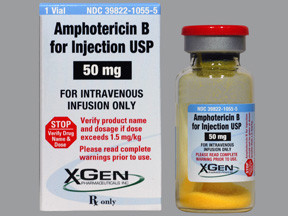AMPHOTERICIN - INJECTION
PHONETIC PRONUNCIATION: (AM-foe-TER-i-sin)
COMMON BRAND NAME(S): Fungizone
GENERIC NAME(S): amphotericin B
Uses
USES: See also Warning section. This medication is used to treat a variety of serious, possibly fatal fungal infections. It works by stopping the growth of fungi.
How to use AMPHOTERICIN - INJECTION
HOW TO USE: This medication is usually given by injection into a vein as directed by your doctor, usually given once a day or every other day. It should be injected slowly over 2 to 6 hours. Your doctor may give you a smaller dose first to test your response to the medication. Dosage is based on your medical condition, weight, response to the test dose, and response to therapy. If this medication is stopped for 7 days or longer, then it should be restarted at the lowest dose and slowly increased. If you are giving this medication to yourself at home, learn all preparation and usage instructions from your health care professional. Before using, check this product visually for particles or discoloration. If either is present, do not use the liquid. Learn how to store and discard medical supplies safely. It may be necessary to continue this medication for several weeks to several months in order to treat certain infections. Stopping the medication too early may result in a return of the infection. Tell your doctor if your condition persists or worsens.
Side Effects
Precautions
Interactions
Overdose
Images
Reviews
Faq for AMPHOTERICIN - INJECTION
Amphotericin injection is an antifungal medication used to treat serious fungal infections, including those that are life-threatening.
Amphotericin works by binding to a component of fungal cell membranes, disrupting their structure and function. This leads to the death of the fungal cells and helps to control or eliminate the infection.
Common side effects of Amphotericin injection may include fever, chills, nausea, vomiting, headache, muscle or joint pain, and loss of appetite. It may also cause changes in blood pressure or electrolyte levels.
Amphotericin injection is usually given through a vein (intravenous) by a healthcare professional in a hospital setting. The dosage and duration of treatment will depend on the specific infection being treated and the individual patient's condition.
In most cases, Amphotericin injection is administered in a hospital or clinic due to the need for close monitoring and the potential for serious side effects. However, in some cases, healthcare providers may teach patients or their caregivers to administer the medication at home under specific guidelines.
Amphotericin injection should not be used in individuals with known hypersensitivity to the medication. Caution should be exercised in patients with kidney problems, electrolyte imbalances, or liver disease. It may interact with certain medications, so it is important to inform your healthcare provider about any other drugs you are taking.
The onset of action can vary depending on the severity of the infection and the individual's response to the medication. Improvement in symptoms may be seen within a few days to a few weeks of starting treatment.
Amphotericin injection is generally not recommended during pregnancy unless the potential benefits outweigh the risks. It may pass into breast milk, so breastfeeding should be avoided during treatment.
If a dose is missed, contact your healthcare provider as soon as possible for guidance. It is important not to double the dose to make up for a missed one.
Warning
WARNING: Amphotericin should be used only to treat serious, possibly fatal fungal infections. This medication should not be used for less severe infections in limited areas of the body (e.g., fungal infection of the mouth/esophagus, vaginal yeast infections) in patients with normal white blood cell counts.
Disclaimer
IMPORTANT: HOW TO USE THIS INFORMATION: This is a summary and does NOT have all possible information about this product. This information does not assure that this product is safe, effective, or appropriate for you. This information is not individual medical advice and does not substitute for the advice of your health care professional. Always ask your health care professional for complete information about this product and your specific health needs.

No Reviews Yet